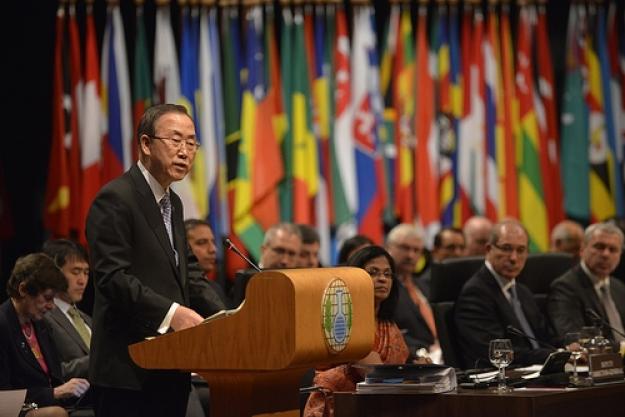
UN Secretary General Ban Ki-Moon addresses the opening session of the Third Review Conference.
The Third Review Conference of the Chemical Weapons Convention (CWC) successfully concluded today with the adoption by consensus of a two-part final document: A political declaration that confirms the “unequivocal commitment” of the States Parties to the global chemical weapons ban, and a comprehensive review of CWC implementation since the last Review Conference in 2008 that also maps out the OPCW’s priorities for the coming five years. The final document will be made available soon on the OPCW web site at http://www.opcw.org
“I congratulate and thank the States Parties for their strong support for our continuing efforts to achieve a world that is free of chemical weapons,” said the OPCW Director-General, Ambassador Ahmet Üzümcü. “They have underlined their commitment that the OPCW remains a global repository of knowledge and expertise on implementing the Convention, and their determination to maintain the CWC as a bulwark against chemical weapons.”
The UN Secretary-General, Ban Ki-moon, delivered a speech to the opening session of the conference. The Foreign Minister of the Netherlands, Frans Timmermans, the Minister of Foreign Affairs and Vice-Prime Minister of Luxembourg, Jean Asselborn, and the Turkish Foreign Minister, Ahmet Davutoğlu, also addressed the conference.
A number of other senior officials attended the opening days of the conference. They included Angela Kane, the UN High Representative for Disarmament Affairs, and high level officials from Canada, Germany, Iran, Iraq, Saudi Arabia, the United Kingdom, the United States and Yemen, among others. Video interviews with some of these senior officials can be viewed here.
The political declaration reiterates the “deep concern” of States Parties that chemical weapons may have been used in the Syrian Arab Republic, underlining that “the use of chemical weapons by anyone under any circumstances would be reprehensible and completely contrary to the legal norms and standards of the international community.” The statement expresses support for close cooperation between the OPCW Director-General and Secretary-General of the United Nations.
Other highlights of the Review Conference political declaration:
- Conviction that, 16 years after its entry into force, the Convention has reinforced its role as the international norm against chemical weapons;
- Unqualified commitment to achieve the universality of the CWC, urgently calling upon the remaining States not Party to join the Convention without delay and precondition;
- Determination that the destruction of all existing chemical weapons be completed in the shortest time possible;
- Commitment to adopt the necessary measures to fully implement the Convention as a matter of priority, noting that 100 States Parties still need to adopt such measures;
- Commitment to foster international cooperation in the peaceful uses of chemistry, and to implement the CWC in a manner that avoids hampering economic and technological development;
- Intention to continue providing the OPCW the support it needs to fully implement the CWC and to deal more effectively with future opportunities and challenges; and
- Desire to improve interaction with chemical industry, the scientific community, academia and civil society organisations in promoting the goals of the CWC.
The Third Review Conference was well attended with delegates from 122 of the 188 States Parties, 8 international organizations and 3 States not Party, and was chaired by Ambassador Krzysztof Paturej of Poland.
In addition, there was an unprecedented level of attendance by civil society, with representatives of 47 NGOs who organised and participated in more than 10 side events exploring a variety of issues relevant to the conference. For the first time, NGO representatives were also permitted to address conference delegates in an informal plenary session. A full listing of conference events can be viewed here.
